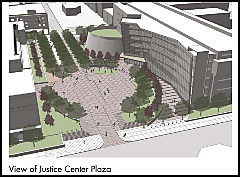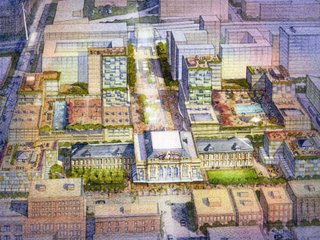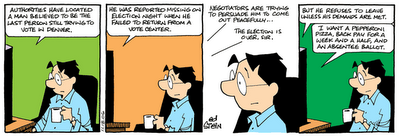
First of all, let's talk about Denver streets and inclement weather, shall we.
At 2:19 p.m. Tuesday, I got a text message from a friend in Lakewood reporting that it was snowing over there. Yes, Lakewood is not Denver, but close enough to be contiguous to our southwest border. After receiving the text message, I headed outside here in Northwest Denver and, yes, the little white buggers were beginning to float to the ground from that gray-white sky that had whispered the coming of something significant all morning (my morning begins at about 5:15 a.m.). So, by shortly after 2 p.m. on Tuesday, it was beginning to snow in Denver. Didn't need a weatherman or a weather service contractor to confirm that fact. I just looked outside.
Now, something about magnesium chloride. From usda.gov, just a little snippet: "The liquid magnesium chloride is sprayed on dry pavement prior to precipitation or wet pavement and prior to freezing temperatures in the winter months to prevent snow and ice from adhering and bonding to the roadway."
With me, so far?
Each weekday, Sarah (our Alaskan Malamute) and I walk from our home in Northwest Denver (at about 4:15 p.m.) to 15th Street and I25, where we meet my partner, David, on his way home from work. We hit Highland Park--32nd and Federal--at about 5:00 p.m. on our way back home. Guess what! By the time we reached the park, it was snowing like hell. (I guess "hell" is probably the wrong word, here. But, you get the drift. :- ] )
This morning's Rocky Mountain News, under the banner, "Slow response sluggish (City blames forecasts for lagging other jurisdictions), reports that, "Denver officials blamed faulty weather forecasts for not fully mobilizing to handle Tuesday's heavy snowstorm until midnight, at least six hours after crews from other jurisdictions had kicked into high gear.
"By the time snow started falling during the evening rush hour, Denver had less than half the number of plows on the streets that would be operating by midnight."
A spokesman from Denver's Department of Public Works, Dan Roberts, said, "...the city relied on faulty weather forecasts from a private contractor and early reports from local television stations."
Not to belabor the point, but do you get the feeling that all Hickenlooper's minions have honed in on hizzoner's penchant for declaring, "Ain't my job, man," and then proceeding to point the finger elsewhere; certainly not at themselves?
Hell, they could have called me at about 2:30 p.m. on Tuesday and I could have told them, "Ah-yup, it's snowing."
Don't know how long the News will keep the story active on it's site, but here's the link.
Yes, Mister mayor, with regard to one of the core functions of a city--duh!--I don't think "...there's anyone here who doesn't believe there were a lot of bad decisions made."
Now, to the election debacle that hizzoner is addressing with yet another committee/task force/assemblage of good ol' boys and gals.
The story in the News is here.
I'm frankly sick of this election mess--my rants (posts) on the subject are prodigious. Suffice it to say, the Hick is, once again, using what I guess is the only tool he believes he has at his disposal , (to assure deniability, and give the impression that, by God, he's digging into the thing) another committee/task force/assemblage or, what I characterized in another post as "...another opening, another show..." (Cole Porter).
Time after time after time, the Hick was warned by Auditor Gallagher and Councilwoman Rosemary Rodriguez and others as well, that an election "tsunami" was looming just around the corner (warnings given in ample time to correct or, at least, alleviate, the disaster of November 7th). Did the Hick act? Nope. Instead he simply espoused the lame echo, "Ain't my job, man."
So, not wanting to string this out any longer (I'm sick of it!) let me just end this by saying, yeah, mayor, I really don't believe there's "...anyone here who doesn't believe there were a lot of bad decisions made." I would include, however, that I don't believe there's anyone here who doesn't believe there were a lot of bad omissions and failures to act, by you, sir. You are a "strong mayor," under the Charter. But, alas, you haven't yet really latched on to that concept, have you.
Votes and snow. Bad decisions. Yup, gotta agree.










